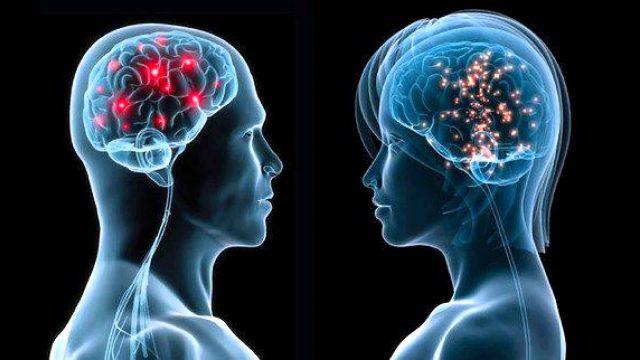10 Important things Every Man should know about Female Brain
Mar 02, 2021
Admin

"There is no such thing as a unisex brain," says neuropsychiatrist Dr. Louann Brizendine of the University of California in San Francisco and author of "The Female Brain."
Despite the trumpets of women's lib, science suggests sex differences are innate. Women, apparently, are not curvy versions of men sporting high-heeled shoes.
Here are 10 things every woman-loving man should know.
 Also Read: 5 Helpful Tips to Get Over the Pain of a Breakup
Also Read: 5 Helpful Tips to Get Over the Pain of a Breakup
 Also Read: 9 Experts Share Their Very Best Piece of Online Dating Advice
Also Read: 9 Experts Share Their Very Best Piece of Online Dating Advice
 Read More: Connecting Offline: 4 Tips to Know if You Should Meet Your Match
Read More: Connecting Offline: 4 Tips to Know if You Should Meet Your Match
 Read More: 4 Life Altering Online Dating Tips Specially for Introverts
Read More: 4 Life Altering Online Dating Tips Specially for Introverts
 Also Read: 12 Essential Flirting Tips Every Guy Needs to Know! Make Getting Girls Easy.
Also Read: 12 Essential Flirting Tips Every Guy Needs to Know! Make Getting Girls Easy.
 Also Read: 5 Helpful Tips to Get Over the Pain of a Breakup
Also Read: 5 Helpful Tips to Get Over the Pain of a Breakup
She changes every day based on her cycle
Affecting up to 80 percent of women, PMS is a familiar scapegoat. But women are affected by their cycles every day of the month. Hormone levels are constantly changing in a woman's brain and body, changing her outlook, energy and sensitivity along with them. About 10 days after the onset of menstruation, right before ovulation, women often feel sassier, Brizendine told LiveScience. Unconsciously, they dress sexier as surges in estrogen and testosterone prompt them to look for sexual opportunities during this particularly fertile period. A week later, there is a rise in progesterone, the hormone that mimics valium, making women "feel like cuddling up with a hot cup of tea and a good book," Brizendine said. The following week, progesterone withdrawal can make women weepy and easily irritated. "We call it crying over dog commercials crying," Brizendine said. For most women, their mood reaches its worst 12-24 hours before their period starts. "It is not entirely an issue of free will," Brizendine stressed. https://www.youtube.com/watch?v=etOKt04UFbw Also Read: The 10 Laws of Desirability ; Make Yourself Attractive To Women.She really is intuitive (though not magic)
Men can have the uncomfortable feeling that women are mind readers or psychics, Brizendine said. But women's intuition is likely more biological than mystical. Over the course of evolution, women may have been selected for their ability to keep young preverbal humans alive, which involves deducing what an infant or child needs — warmth, food, discipline &mdash without it being directly communicated. This is one explanation for why women consistently score higher than men on tests that require reading nonverbal cues. Women not only better remember the physical appearances of others but also more correctly identify the unspoken messages conveyed in facial expressions, postures, and tones of voice, studies show. This skill, however, is not limited to childrearing. Women often use it to tell what bosses, husbands and even strangers are thinking and planning. Also Read: 9 Experts Share Their Very Best Piece of Online Dating Advice
Also Read: 9 Experts Share Their Very Best Piece of Online Dating Advice
She avoids aggression
Stressful situations are known to spur the "fight or flight" response in men, but researchers have suggested that women, after sensing a threat, instinctually try to "tend or befriend." That is, the skirt physical responses in favor of forming strategic, even manipulative, alliances. Women may have evolved to avoid physical aggression because of the greater dependence of children on their survival, suggests Anne Campbell of Durham University. (In ancient hunter-gatherer days, men only needed to do the deed to spread their genes, while women had to stay alive long enough to birth and raise the young.) "It is not that females are not aggressive, it is that they are aggressive in different ways," said evolutionary psychologist Daniel Kruger of the University of Michigan. They tend to use more indirect forms of confrontation, he told LiveScience.She responds to pain and anxiety differently
Brain-imaging studies over the last 10 years have shown that male and female brains respond differently to pain and fear. And, women's brains may be the more sensitive of the two. The female brain is not only more responsive to small amounts of stress but is less able to habituate to high levels of stress, said Debra Bangasser of the Children's Hospital of Philadelphia, describing her recent research looking at molecular changes in the brain. Bangasser's research was conducted in rats but is considered potentially applicable to humans. Stress sensitivity may have some benefits; it shifts one's mental state from being narrowly focused to being more flexibly and openly aware. But if the anxiety is prolonged, it can be damaging. Such findings may help explain why women are more prone to depression, post-traumatic stress disorder and other anxiety disorders, the researchers told LiveScience. The research was published in the June 2010 issue of Molecular Psychiatry. Read More: Connecting Offline: 4 Tips to Know if You Should Meet Your Match
Read More: Connecting Offline: 4 Tips to Know if You Should Meet Your Match
She hates conflict (but lack of response even more)
Women may also have evolved extra-sensitivity to interpersonal cues as a way to avoid conflict, a state that can feel intolerable to women, according to Brizendine. The flood of chemicals that takes over the female brain during a conflict -- especially within an intimate relationship — is almost on the same order as a seizure, she explains. Possibly because of their overachievement in "mind-reading," women often find blank expressions, or a lack of response, completely unbearable. A young girl will go to great lengths trying to get a response from a mime while a boy will not be nearly so determined, Brizendine said. For females in particular, a negative response may be better than no response at all.She is easily turned off
"A women's love drive is much more easily upset than a guy's," Brizendine said. For women to get in the mood, and especially to have an orgasm, certain areas of her brain have to shut off. And any number of things can turn them back on. A woman may refuse a man's advances because she is angry, feeling distrustful -- or even because her feet are chilly, studies show. Pregnancy, caring for small children and menopause can also take a toll on a woman's love drive (although some women experience a renewed interest in love after The Change.) Best advice for a turned-on dude? Plan ahead. "For guys, foreplay is everything that happens three minutes before insertion. For women, it is everything that happens 24 hours beforehand," Brizendine said. [Top 10 Aphrodisiacs] Read More: 4 Life Altering Online Dating Tips Specially for Introverts
Read More: 4 Life Altering Online Dating Tips Specially for Introverts
She is affected by pregnant brain
Progesterone increases 30-fold in the first eight weeks of pregnancy, causing most women to become very sedated, Brizendine said. "Progesterone is a great sleeping pill." A woman's brain also shrinks during pregnancy, becoming about 4-percent smaller by the time she delivers, according to a 2002 study published in the American Journal of Neuroradiology. (Don't worry; it returns to normal size by six months after delivery.) Whether pregnancy causes women to think differently is controversial -- one recent study linked memory problems to pregnancy hormones -- but some researchers have suggested the changes prepare brain circuits that guide maternal behavior. These circuits likely continue to develop after birth. Handling a baby releases maternal hormones, even among females who have never been pregnant, found researchers at Tufts University. While measured in rats, the finding offers a chemical understanding of the bonding that can occur among foster moms and children. The study was published in the journal Developmental Psychobiology in 2004.She is affected by mommy brain
The physical, hormonal, emotional and social changes facing a woman directly after giving birth can be monumental. "And because everything else has changed, she needs everything else to be as predictable as possible, including the husband," Brizendine said. Over the course of evolution, it was rare for our maternal ancestors to be full-time mothers, said Brizendine, because there was always kin-folk around to help with child-rearing. And a mother needs a lot of support, not only for her own sake but for the child's as well. Her ability to adequately respond to her infant can impact the child's developing nervous system and temperament, research shows. One way Mother Nature tries to help is through breastfeeding. Nursing may help women deal with some types of stress, studies suggest. (Too much stress, however, can disrupt lactation.) One study even found that breastfeeding might be more rewarding to the female brain than cocaine. The research was published in the Journal of Neuroscience in 2005. Also Read: 12 Essential Flirting Tips Every Guy Needs to Know! Make Getting Girls Easy.
Also Read: 12 Essential Flirting Tips Every Guy Needs to Know! Make Getting Girls Easy.

